- Home
- Roy J. Snell
The Cruise of the O Moo Page 15
The Cruise of the O Moo Read online
Page 15
CHAPTER XV THE ISLAND'S SECRET
Twenty-four hours after Florence's mysterious discovery, the cabin of theO Moo was pervaded by a quiet and studious atmosphere. Lucile, who wasquite herself again, was mastering the contents of a book devoted to thestudy of the technique of short story writing. Florence was delving intothe mysteries of the working of the human mind. Marian was doing a stilllife study in charcoal.
One might conclude that by some hosts of good fairies the yacht had beenspirited back to its place on the dry dock. This was not, however, thecase. The O Moo was still standing in the little stream on the sandyisland. Its position had been altered a trifle. It had been poled outinto midstream and there anchored. This precaution the girls had felt wasnecessary. In case the Negontisks attempted to board the yacht it wouldgive those on board a slight advantage. It is difficult to board a yachtfrom kiaks.
That the strange persons who lived in holes beneath the sand dunes werethese wild natives they did not doubt. "For," Marian had reasoned, "whoelse in all the wide world would live in such a manner?"
"Yes, but," Florence had argued, "how did they ever get to the shores ofLake Michigan anyway?"
The question could not be answered. The fact remained that there werepeople living beneath the ground on this island and that the girls wereafraid of them, so much afraid that they were not willing, voluntarily,to expose themselves to view.
This was why they were remaining aboard the O Moo and studying ratherthan attempting to catch fish. "Might as well make the best of our time,"Florence had reasoned. To this the others had agreed but when she went onto say that she somehow felt that they would be back at the universityfor final exams, they shook their heads.
The food supply was growing lower with every meal. Six cans of theunknown fruits and vegetables had been opened and with all the perversityof unknown quantities had turned out to be fruit, pleasing but notnourishing.
"There's some comfort in knowing that there are other people on theisland, at that," Lucile had argued. "They've probably got a supply offood and, rather than starve, we can cast ourselves upon their mercy."
"How many of them do you suppose there are?" Marian suddenly looked upfrom her book to ask.
"Only saw one," answered Florence, "but then of course there are others."
"Strange we didn't see any tracks when we went the rounds of the island."
"Snowed the night before."
"But people usually have things outside their igloos; sleds, boats andhunting gear."
"Not when they're in hiding. There might be fifty or a hundred of them.Nothing about an igloo shows unless you chance to walk right up to theentrance or the skylight. And we didn't. We--"
She broke off abruptly as Lucile whispered. "What was that?"
She had hardly asked the question when the sound came again--a loudtrill. It was followed this time by a musical:
"Who-hoo!"
"I never heard a native make a sound like that," exclaimed Lucile,springing to her feet.
"Nor I," said Marian.
"Sounds like a girl."
Throwing caution to the wind the three of them rushed for the door.
On reaching the deck, they saw, standing on shore, a very short, plumpperson with a smiling face. Though the face was unmistakably that of awhite girl, she was dressed from head to toe in the fur garments of anEskimo.
"Hello there," she shouted, "Let down the gang plank. I want to comeaboard."
"Haven't any," laughed Florence. "Wait a minute. You climb out on thatold tree. We'll pole the yacht around beneath it, then you can drop downon deck."
"What a spiffy little cabin," exclaimed the stranger as she entered thedoor and prepared to draw her fur parka off over her head. "I wasn'texpecting company. When did you arrive?"
"Came in with the ice-floe," smiled Marian.
"Are--are you a captive?" asked Lucile suddenly. "And--and do they makeyou live with them?"
"Captive? Live with whom?" the girl's eyes were big with wonder.
"The Negontisks."
"The what?"
"The Negontisks."
"Why, no, child. Of what are you dreaming? I never saw a Negontisk, letalone living with them. Heard of them though. Please explain."
She bounced down into one of the overstuffed chairs with a little sigh of"Oh! What delicious comfort! You don't know how strange it is to livelike an Eskimo. It's trying at times, too."
It took a great deal of explaining for Lucile to make the reasons for herquestions clear to the stranger. In the meantime, Florence had anopportunity to study their visitor.
"Very small, not weighing over ninety pounds, very vivacious, decidedlyAmerican and considerably older than we are," was her final analysis.
"Why! My dear!" the little lady cried when Lucile had explained. "You mayput your mind quite at ease. Besides yourselves I am positively the onlyperson on the island. What's more," she smiled, "I have in my igloooodles and oodles of food, enough for all of us for six months to come."
The three girls fairly gasped in their relief and delight. It was withthe greatest difficulty that they refrained from embracing the visitor.
"I suppose," said the stranger, "that you would like to know how it comesabout that I am living here on this island all by myself; and, above allthings, in an igloo. Well, you see, my uncle owns this island. He is aretired Arctic trader. For twenty years he lived on the coast of theArctic--made a huge fortune in furs and whale bone. Then he came back tothe city to live.
"Well, you see," she sighed after a pause for breath, "he had lived inigloos on the Arctic coast for so long that he wasn't satisfied with thecave he lived in on the shores, in the noisy city. So what does he do butbuy this little island and have a wonderful little igloo built beneathone of its sand dunes?
"Of course he doesn't live in his igloo all the time; just comes overwhen he wishes to. This winter he is spending in Florida so he lent hisigloo to me.
"I graduated from the university last year. And I wanted to write a book,a book about the vanishing race--the Eskimo. Sort of an Eskimo Ramona,don't you know.
"I had never been in Alaska but my uncle had told me about it. Nights andnights he talked about nothing else, so I knew enough to make a book. AllI needed was the atmosphere. I thought I could get that best by comingout here and living in his igloo all by myself, paddling about in a kiak,fishing through the ice and all that. So that," she laughed, "is how Icame to be here."
The three girls stared at her with looks of wonderment in which wasmingled not a little joy. Had she been a fairy come down from some magickingdom to render them a great service she could hardly have been morewelcome.
"Oh!" she cried, bouncing up from her chair, "You shall all go to myigloo. We will have dinner together there and--and why don't you bringalong a few of your things, prepared to stay all night? You'll hardly beleaving to-night. No, of course you won't. Ice won't let you."
"It's not alone the ice," said Florence soberly. "We don't know how tostart our motor."
"Oh! Those motors! There now!" she exclaimed "I've never told you myname. It's Marie Neighbor. What are yours?"
The girls told her.
"Motors are a real bother," she said, returning to her original subject."Uncle has had six or eight of them in all, on cars, yachts and all that.Not one of them was like any other one. I puzzled my poor old head nearlyoff over them but I always succeeded in making them go. They're worsewhen there's no gas. Once I tried a pint of ether and some moth ballsinstead of gas. That came near being my last experiment. The cylinderexploded. Perhaps I can help you with your engine. Let's have a look."
Florence led the way to the engine room and there switched on a light.
Marie studied the motor for a moment.
"But my dear," she exclaimed at last, "this wire should be fastened thereand that one here. You have them crossed. That will never do. Hope youhaven't ruined your batteries. But never you mind, I h
ave a set down atthe igloo."
"Now about the timer. That screw's loose there. Off time of course. Why,there's nothing the matter with the motor; not really. We'll have itgoing in a moment."
She gave the balance wheel a turn. There followed a sucking sound. Asecond turn brought a similar result; the third elicited a loud explosionand the fourth threw the engine into such a spasm of coughing as set thewhole yacht a-tremble.
"There you are," she exclaimed triumphantly. "I told you there wasn'tanything the matter." She touched a lever. The engine stopped. Then shereached for a handful of waste with which to clean her dainty fingers.
"Now," she said, "shall we go over to the igloo? I think the wind ischanging. The ice may be going out to-night. In that case you may bewishing to leave in the morning. The yacht will be all right here. No oneabout and no chance for her to go out of the river. Throw a line out andtie her to the shore. That'll make her doubly safe."
Delighted with this strange and efficient hostess, the girls went aboutthe task of making the ship snug, then, having each gathered up a smallbundle of clothing, went ashore.
"By the way," said Marie, "if you don't mind I think I'd like to go backto the city with you. I'll work my passage as chief engineer."
"That would be splendid!" said Florence enthusiastically. "I've beenworrying about the engine. We might get it going and not be able to stopit."
"And might stop it and not get it going again," laughed Marie. "Well, I'mglad that's arranged. A friend had promised to come after me, but I wastalking to him night before last and he told me his boat had sprung aleak. Didn't think he could come."
"You were talking with him?" cried Marian.
"Yes, radio, don't you know. Oh! I didn't tell you. I have a radiophonefor short-distance work. Uncle insisted on my having it; thought Iwouldn't be safe without it. When I wish to talk to shore all I have todo is to hoist up my two portable towers, key up my instrument and startright in jabbering away. I have the wireless too, and can talk to myuncle way down in Florida."
Florence took a long breath. "So this," she told herself, "is theexplanation of the phantom wireless."
"By the way," said Marie, "your friends must be anxious about you. Ofcourse they must be. I'll get my little talking machine going as soon aswe are at the igloo and you may tell them all your troubles; also assurethem you'll be home to-morrow or the next day."
"Oh! How can we thank you?" cried Lucile.
"Don't have to," laughed their hostess. "It doesn't cost me anything andI'm to get a free passage home for it."
"Talking about things being free," she said pointing to the splendidlittle evergreens all about them. "See all those trees! They reallyshould be thinned out. They're free for the asking. Yet there are tenthousand homes in the city where there will be no Christmas tree thisyear. What do you say we cut down two or three hundred of them and takethem along? We can play Santa to that many families anyway."
"I think it's a fine idea," said Lucile.
"So do I! So do I," said the others in unison.
"Well then that's all settled. And now for a lark. Watch out; here's theentrance to the igloo. Just take a look down, then we'll get up thetowers and start talking across empty space to the poor tired old city,"laughed Marie.

 On the Yukon Trail
On the Yukon Trail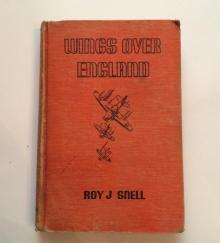 Wings over England
Wings over England Johnny Longbow
Johnny Longbow Sally Scott of the WAVES
Sally Scott of the WAVES The Secret Mark
The Secret Mark Betty Leicester's Christmas
Betty Leicester's Christmas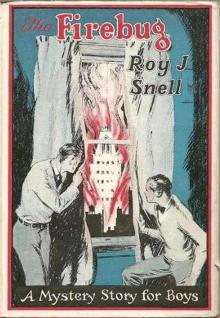 The Firebug
The Firebug Minnie Brown; or, The Gentle Girl
Minnie Brown; or, The Gentle Girl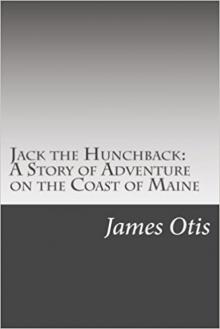 Jack the Hunchback: A Story of Adventure on the Coast of Maine
Jack the Hunchback: A Story of Adventure on the Coast of Maine The Silent Alarm
The Silent Alarm The Arrow of Fire
The Arrow of Fire The Magic Curtain
The Magic Curtain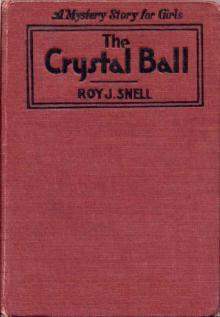 The Crystal Ball
The Crystal Ball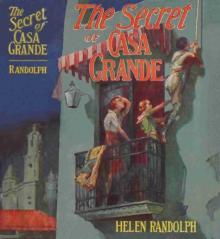 The Secret of Casa Grande
The Secret of Casa Grande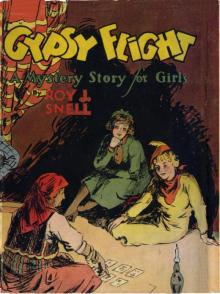 Gypsy Flight
Gypsy Flight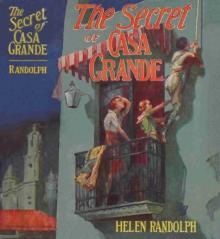 The Mystery of Carlitos
The Mystery of Carlitos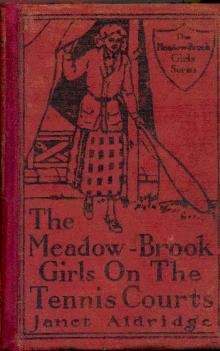 The Meadow-Brook Girls on the Tennis Courts; Or, Winning Out in the Big Tournament
The Meadow-Brook Girls on the Tennis Courts; Or, Winning Out in the Big Tournament Witches Cove
Witches Cove Riddle of the Storm
Riddle of the Storm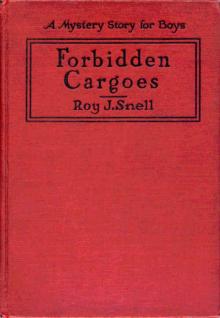 Forbidden Cargoes
Forbidden Cargoes Green Eyes
Green Eyes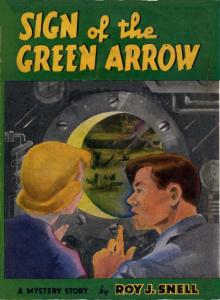 Sign of the Green Arrow
Sign of the Green Arrow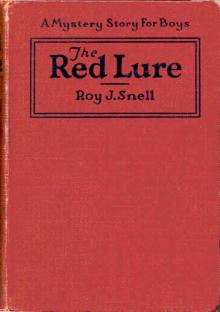 The Red Lure
The Red Lure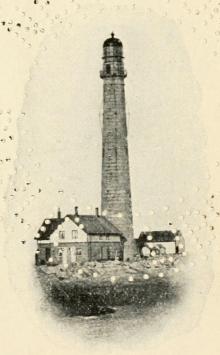 The Light Keepers: A Story of the United States Light-house Service
The Light Keepers: A Story of the United States Light-house Service A Ticket to Adventure
A Ticket to Adventure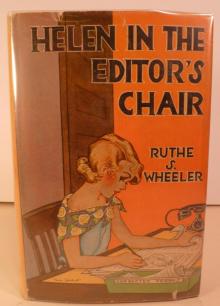 Helen in the Editor's Chair
Helen in the Editor's Chair Blue Envelope
Blue Envelope The Purple Flame
The Purple Flame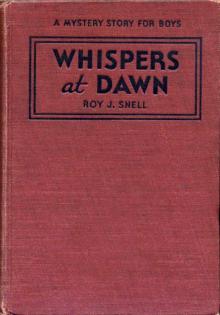 Whispers at Dawn; Or, The Eye
Whispers at Dawn; Or, The Eye The Rope of Gold
The Rope of Gold Crossed Trails in Mexico
Crossed Trails in Mexico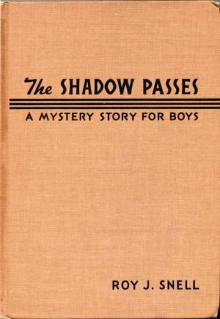 The Shadow Passes
The Shadow Passes Red Dynamite
Red Dynamite Blue Grass Seminary Girls on the Water
Blue Grass Seminary Girls on the Water The Cruise of the O Moo
The Cruise of the O Moo